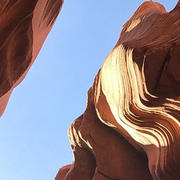
In Navajo worldview, thought creates the world, which is then spoken into being. This process places sacred value on the power of language. Sherwin Bitsui’s poetry attempts to connect Diné thought to a changed world by translating the present through an encoding rooted in his culture and language. In this excerpt from his talk at Harvard Divinity School, he offered insight into how Navajo thought and language can inform a poetics, thus opening possibilities for poetry.
Sherwin Bitsui is the author of three collections of poetry: Dissolve, Flood Song, and Shapeshift. He is Diné of the Todí¬ch’ii’nii (Bitter Water Clan), born for the Tlizí¬laaní¬ (Many Goats Clan), and has received the Whiting Award, the American Book Award, and the PEN Book Award.
FULL TRANSCRIPT:
[MUSIC PLAYING]
SHERWIN BITSUI: [SPEAKING NAVAJO]
My name is Sherwin Bitsui. And I'm of the Bitter Water People, who are my mother's clan and her mother's clan and her grandmother's clan and her great-grandmother's clan. And that clan system goes all the way back to the beginning of time. And that lineage is passed through the woman because we're a matrilineal society and culture.
I'm born from my father's clan. And like me, he's born for his-- he is of his mother's clan and her clan and her mother's clan and her grandmother's clan and so on. And he is of the Many Goats People. And my maternal grandparents are the Kinyaa'aanii People. And again, those are my grandparents. So anybody who has that clan, I refer to them as my maternal grandparents.
And that particular clan is one that I could probably say is a probably Puebloan clan. I don't know the whole story. But when I think of the clan as an image, it is a Towering House. And these are the people who lived in a Towering House. And if anybody's been to the southwest, one might notice that there are Puebloan buildings, ancestral Puebloan buildings there that are tall and also towering houses.
My paternal grandparents are the Coyote Pass People. And that's my Nali's clan. And he was a medicine man. And I'll talk a little bit about him in this talk. And they are the clan I can probably locate in recent memory and recent time.
They are originally from the Jemez Pueblo People. And somehow we absorbed them into our culture. We adopted a couple of women. And they eventually had children. And they were of the Coyote Pass People. And the period that that takes place, that adoption takes place, is probably in the maybe, say, 1600s after the Pueblo Revolt.
I'm originally from the Navajo reservation in the Four Corners area. It's the high desert. And I grew up in a traditional Navajo family. I was a shepherd when I was growing up. And I feel like that still informs a lot of my work.
And when I say I grew up in a traditional family, I'm actually saying that my family followed a tradition and a way of life that was connected to deep ancestral-- I mean, it was just connected to the place and time and the ancestors of our people. So that's where I'm from.
And I also want to acknowledge the ancestors of this land, the Massachusetts and Wampanoag people, and their connection and their stories that live on in this place. They've named this place. A lot of your rivers here are probably named by them. If you just pay attention to the words, you can follow them. And each of them is a story. And each of them is a history.
I was able to do that recently in Marfa, Texas. I had a residency there last month. And there's a mountain range in this particular area in South Texas. And the mountain range is called Chinati. And there's a really famous, fancy foundation called the Chinati Foundation. And they also have offices in New York.
But for some reason I was driving through the landscape and I actually placed my language on top of that word with all the accents and stuff. And then suddenly that word transformed. And then suddenly that word was not Chinati, the anglicized version.
It was an Athabaskan word, an Apache word. And we share a common language with them. It's not too similar, but they vary. And they're a little bit different. But the word itself, as I put diacritics on it, it became [SPEAKING NAVAJO]. And in Navajo that means a place of exiting, a place of moving out.
[MUSIC PLAYING]
